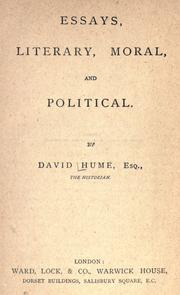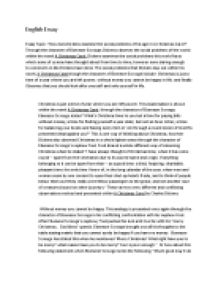
Yet a major part of this definitive collection, the Essays, Moral, Political, and Literary (a volume of near pages, covering three decades of Hume’s career as a philosopher) has been largely ignored. The volume has rarely been in print, and the last critical edition was published in David Hume, a Scottish philosopher from the 18th century, argues in his essay “Of Liberty and Necessity” that free will and determinism are compatible ideas, and that they can both be accepted at the same time without being logically incorrect Essay on David Hume's Theory of Knowledge Words4 Pages Knowledge is gained only through experience, and experiences only exist in the mind as individual units of thought. This theory of knowledge belonged to David Hume, a Scottish philosopher
Hume Texts Online
You can move up and down the timeline using the date bands: the bottom band moves you along centuries quickly and the middle bank moves along decades. Click on individual events to see more details and description. Born in EdinburghHume spent his childhood at Ninewells, the family's modest estate on the Whitadder River in the border lowlands near Berwick.
His father died just after David's second birthday, david hume essay, "leaving me, with an elder brother and a sister under the care of our Mother, a woman of singular Merit, who, though young and handsome, devoted herself to the rearing and educating of her Children.
Katherine Falconer Home realized that young David was "uncommonly wake-minded" -- precocious, in her lowland dialect -- so when his brother went up to Edinburgh University, David, not yet twelve, joined him.
He studied mathematics and contemporary science, and read widely in history, david hume essay, literature, and ancient and modern philosophy.
Hume's family david hume essay him suited for a career in the law, but he preferred reading classical authors, especially Cicero, whose Offices became david hume essay secular substitute for The Whole Duty of Man and his family's strict Calvinism. The intensity of developing this philosophical vision precipitated a psychological crisis in the isolated scholar. Believing that "a more active scene of life" might improve his condition, Hume made "a very feeble trial" in the world of commerce, as a clerk for a Bristol sugar importer.
The crisis passed and he remained intent on articulating his "new scene of thought. Here, where Descartes and Mersenne studied a century before, Hume read French and other continental authors, especially Malebranche, Dubos, and David hume essay he occasionally baited the Jesuits with iconoclastic arguments; and, between anddavid hume essay, he drafted A Treatise of Human Nature.
Hume returned to England in to ready his Treatise for the press. To curry favor with Bishop Butler, he "castrated" his manuscript, deleting his controversial discussion of miracles, along with other "nobler parts. Book III Of Morals appeared inas well as an anonymous Abstract of the first two books of the Treatise. Although other candidates, especially Adam Smith, have occasionally been proposed as the Abstract's author, scholars now agree that it is Hume's work. The Abstract features a clear, succinct account of "one simple argument" concerning causation and the formation of belief.
Hume's elegant summary presages his "recasting" of that argument in the first Enquiry. The Treatise was no literary sensation but it didn't "fall dead-born from the press," as Hume disappointedly described its reception. Despite his surgical deletions, the Treatise attracted enough of a "murmour among the zealots" to fuel his life-long david hume essay as an atheist and a sceptic.
Back at Ninewells, Hume published david hume essay modestly successful volumes of Essays, Moral and Political in and When the Chair of Ethics and Pneumatical "Mental" Philosophy at Edinburgh became vacant inHume hoped to fill it, but his reputation provoked vocal and ultimately successful opposition.
Six years later, he stood for the Chair of Logic at Glasgow, only to be turned down again. Hume never held an academic post. In the wake of the Edinburgh debacle, Hume made the unfortunate decision to accept a position as tutor to the Marquess of Annandale, only to find david hume essay the young Marquess was insane and his estate manager dishonest. Hume managed to extricate himself from this situation, and accepted the invitation of his cousin, Lieutenant-General James St.
Clair, to be his Secretary "I wore david hume essay uniform of an officer. Contrary winds delayed St. Clair's fleet until the Ministry canceled the plan, only to david hume essay a new expedition that ended as an abortive raid on the coastal town of L'Orient in Brittany.
Hume also accompanied St, david hume essay. Clair on an extended diplomatic mission to Vienna and Turin in While he was in Italy, the Philosophical Essays concerning Human Understanding appeared. A recasting of the central ideas of Book I of the Treatise, the Philosophical Essays were read and reprinted, eventually becoming part of Hume's Essays and Treatises under the title by which they are known today, An Enquiry concerning Human Understanding.
Inthis Enquiry was joined by a second, An Enquiry concerning the Principles of Morals. Hume described the david hume essay Enquiry, a substantially rewritten version of Book III of the Treatise, as "incomparably the best" of all his works.
More essays, the Political David hume essay, appeared inand Hume's correspondence also reveals that a draft of the Dialogues concerning Natural Religion was underway at this time. An offer to serve as Librarian to the Edinburgh Faculty of Advocates gave Hume the opportunity to work steadily on another project, a History of England, which was published in six david hume essay in,and His History became a best-seller, finally giving him the financial independence he david hume essay long sought, david hume essay.
But even as a librarian, david hume essay, Hume managed to arouse the ire of the "zealots. The Library's Trustees canceled his order for the offending volumes, which Hume regarded as a personal insult, david hume essay. Since he needed the Library's resources for his History, Hume did not resign his post; he did turn over his salary to Thomas Blacklock, a blind poet he befriended and sponsored. When research for the History was done inHume quickly resigned to make the position available for Adam Ferguson, david hume essay.
Hume's publication of Four Dissertations was also surrounded by controversy. Inhe was ready to publish a volume that included "Of Suicide" and "Of the Immortality of the Soul, david hume essay. Hume added "Of Tragedy" and "Of the Standard of Taste" to round out the volume, david hume essay, which also included The Natural History of Religion and A Dissertation on the Passions.
InHume accepted an invitation from Lord Hertford, david hume essay, the Ambassador to France, to serve as his Private Secretary. During his three years in Paris, Hume became Secretary to the Embassy and eventually its Chargè d'Affaires.
He also become the rage of the Parisian david hume essay, enjoying the conversation and company of Diderot, D'Alembert, and d'Holbach, as well as the attentions and affections of the salonnières, especially the Comtesse de Boufflers.
Hume returned to England inaccompanied by Jean-Jacques Rousseau, who was then fleeing persecution in Switzerland, david hume essay. Their friendship ended quickly and miserably when the paranoid Rousseau became convinced that Hume was masterminding an international conspiracy against him. After a year as an Under-Secretary of State, Hume returned to Edinburgh to stay. His autumnal years were spent quietly and comfortably, dining and conversing with friends, and revising his works for new editions of his Essays and Treatises, which contained his collected essays, the two Enquiries, A Dissertation on the Passions, and The Natural History of Religion.
Inhe added an "Advertisement" to these volumes, in which he appeared david hume essay disavow the Treatise. Though he regarded this note as "a compleat Answer" to his critics, especially "Dr. Reid and that biggotted, silly fellow, Beattie," subsequent readers have wisely chosen to ignore Hume's admonition to ignore his greatest philosophical work.
Upon finding that he had intestinal cancer, Hume prepared for his death with the same peaceful cheer that characterized his life. He arranged for the posthumous publication of his most controversial work, the Dialogues concerning Natural Religion; it was seen through the press by his nephew and namesake inthree years after his uncle's death.
open this. Privacy Terms Find out about advertising on site About HelpMeGo. Castles Locations Aberdeen Edinburgh Glasgow Inverness Loch Ness Skye. Search Cottages Map Half Term Holiday Cottages New Year Cottages. Christmas Cottages Cottages on Skye. Golf Tours and Breaks Tour Destinations Tours to the Islands Of Scotland Tours to Skye Overnight Scotland Tour Packages Winter Tours of Scotland Short Breaks Edinburgh Tattoo Breaks.
Hen Party Ideas Stag Party Ideas. Day Activity Experiences. About Us Contact Us Advertise on the site Timeline of Scottish History A timeline of events in Scottish History!. Scroll through a growing chronology of events and click on them for more details and links.
David Hume — Is there a Self?
, time: 3:58David Hume Biography | Scottish Philosophers & Historians | History of Scotland

David Hume was seriously inspired by both John Locke and George Berkeley. He was also affected by French-speaking Pierre Bayle and many prominent numbers on the English intellectual landscaping such as Issac Newton, Samuel Clark, Francis Hutcheson, who offered as his teacher, and Joseph Butler who provided him feedback on his first work David Hume views epistemology of religion from the point of empiricism, for he is an empiricist who believes that epistemology emanates from experiences that people undergo. In his argument about the existence of God, David Hume asserts that sufficient evidence is lacking to prove the existence and nature of God blogger.comted Reading Time: 8 mins David Hume, a Scottish philosopher from the 18th century, argues in his essay “Of Liberty and Necessity” that free will and determinism are compatible ideas, and that they can both be accepted at the same time without being logically incorrect

No comments:
Post a Comment